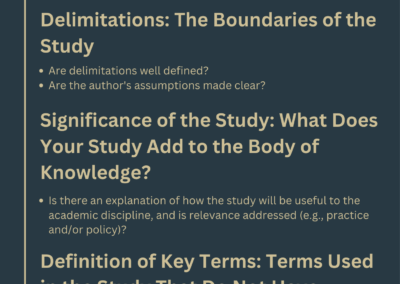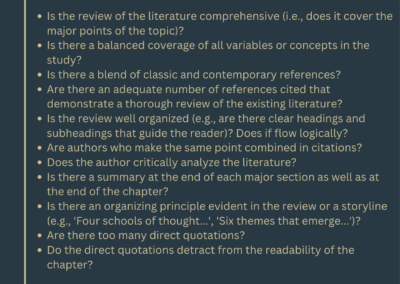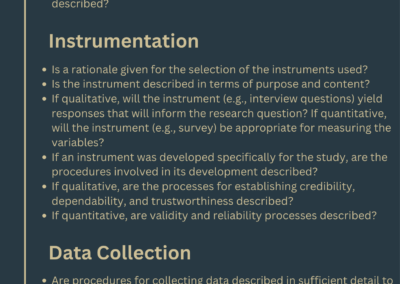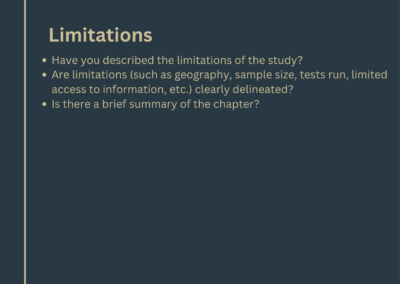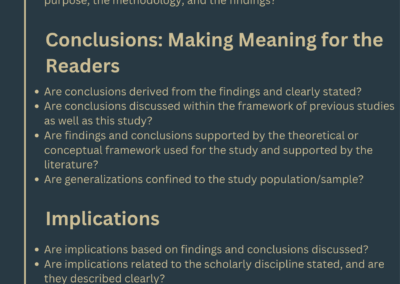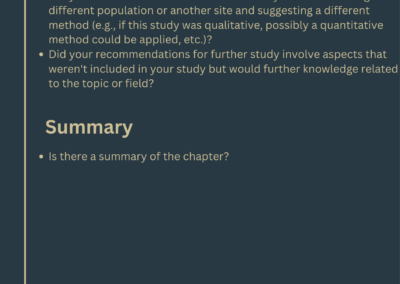Dissertation Process
The documentation of independent research that makes a contribution to knowledge.
(Davis et al., 2012, p. 13)
A doctoral dissertation is a formal document that demonstrates your ability to conduct research that makes an original contribution to theory or practice. It is a partial fulfillment of the requirements for a doctoral degree (e.g., an EdD, DBA, PhD, PsyD, etc.). The term original, according to the Council of Graduate Schools (1991), ‘implies some novel twist, fresh perspective, new hypothesis, or innovative method that makes the dissertation project a distinctive contribution’ (p. 15).
(Roberts & Hyatt, 2019, 38/205)
Dissertation
A dissertation refers to the documents created for a doctoral degree.
Thesis
A thesis refers to the documents created for a master’s degree.
General Doctral Program Schedule
- Coursework (3 – 4 years)
- Doctoral Portfolio (end of coursework)
- Doctoral Candidate (after successfully passing doctoral portfolio)
- Dissertation Proposal (1 – 2 years)
- Dissertation Defense (1 – 3 years)
- Graduate after successfully passing dissertation defense.
*Average time to complete ranges from 4 to 8 years.
General Outline for a Dissertation
Quantitative Outline
Chapter I: Introduction/Problem Statement
- Purpose of the study
- Research questions/null hypotheses/hypotheses
- Significance of the study
- Delimitations/assumptions
- Definition of terms
Chapter II: Review of the Literature
- Topics/subtopics
- Literature Map
- Synthesis of Literature
Chapter III: Methodology
- Type of research
- IRB
- Population, sample, power analysis
- Instrumentation
- Data collection procedures
- Statistical analysis procedures, validity and reliability
- Assumptions and limitations
Chapter IV: Results
- Findings, not inferences
Chapter V: Discussion and Conclusion
- Inferences
- Implications
- Futuer research recommendations
- Practical significance
- Impact to discipline
Qualitative Outline
Chapter 1: Introduction
- Topic and research problem
- Rationale/purpose of study
- Guiding questions
- Theoretical/conceptual framework
- Significance of the study
- Delimitations
- Definitions
Chapter 2: Review of the Literature
- Topics/subtopics
- Synthesis
- Summary
Chapter 3: Methodology
- Rationale and assumptions for the qualitative design
- Type of design
- Researcher’s role
- Protection of human subjects (IRB)
- Site and sample selections
- Data collection techniques
- Instrument
- Managing, recording, and transcribing or presenting data
- Data anlysis procedures, including credibility and dependabilty
- Limitations
Chapter 4: Methods for verification/trustworthiness
- Coding process
- Themes
Chapter 5: Results/outcome of the study
- Discussion
- Connections to previous research
- Implications
- Recommendations for future research
- Conclusions
(Roberts & Hyatt, 2019, 38-40/205)
The Advisor’s Role
Dissertation Chair
- Provide guidance
- Respond to the papers given to read within a reasonable time
- Be resonably consistent in advice
- Protect the student from unreasonable demands
- Assist the student at those times when the voice of a faculty member advocate is necessary
- Generally aid the student in pursuing the dissertation project.
(Davis et al., 2012, p. 7)
The Student’s Role
- Do what is expected on time (or explain why it cannot be done)
- Have integrity in research and writing
- Keep in communication by scheduling regular meetings (face-to-face or virtual) with the advisor
- Prepare documents for comment
- Follow a method of presentation that effectively uses the advisor’s and committee’s time
- Be reasonable in making demands on the time of the advisor and the committee
- Be open to suggestions and to advice, but also show initiative.
(Davis et al., 2012, pp. 7-9)
The advisor gives guidance and advice, acts as sponsor with the committee, and is the one most able to protect the candidate from possible unfair demands by the dissertation committee.
(p. 51)
Every doctoral student working on a dissertation should personally manage his or her project. This means that every student doing a dissertation should develop a plan and a schedule.
(p. 20)
Common Roadblocks for Students to Overcome
APA identified some of the common roadblocks that students must overcome to successfully complete their dissertation:
- Not carefully selecting your chair and committee members.
- Not understanding the requirements of the program/university.
- Not knowing when to say ‘enough!’
- Not taking time for yourself.
University (UNT) and Departmental (LT) Policies
University of North Texas (UNT)
Toulouse Graduate School
University Policies
University of North Texas (UNT)
Toulouse Graduate School
Guidebook:
University of North Texas (UNT)
College of Information
Department of Learning Technologies
Characteristics of a Good Dissertation Topic
(Davis et al., 2012, p. 58)
- Research needed and interesting.
5. Symmetry of potential outcomes.
2. Theory base for research.
3. Amenable to research methods.
4. Achievable in reasonbale time.
6. Matches student capabilities and interest.
7. Attractive for funding.
8. Area for professional development.
Selecting a Dissertation Topic
Deciding if a particular topic has the potential for becoming a dissertation is one of the biggest challenges faced by doctoral students. There a no hard-and-fast rules in selecting a topic; however, the following are some criteria that will help in making your decision:
(Roberts & Hyatt, 2019, 47/205, 62/205)
- It needs to hold your interest over a long period of time. It takes longer than you anticipate to write an acceptable dissertation.
- It must be manageable in size. Most students begin with a topic that is too large. Remember you can’t do it all. Your goal is to add a small but significant piece to the knowledge base and graduate! Save the Nobel Prize-level research to do as a postgraduate.
- It must have the potential to make an original and significant contribution to knowledge. Can you find a hole, a gap, a missing piece in the knowledge base you can fill and would be useful to theory or practice?
- Is should be doable within your time frame and budget. Given your current situation, is it a feasible topic to undertake? Conducting a longitudinal study may not be advisable, based on your time to completion.
- It must be based on obtainable data. You must be able to collect new data or there must be available data for the study from an appropriate sample size in a reasonable period of time.
- It should be of interest to an advisor or committee. The signatures of these indivdiuals determine whether or not you become ‘doctor.’
100 PhD Rules of the Game to Successfully Complete a Doctoral Dissertation
- General advice (Overall; Rules 1-19)
- Finding a supervisor (Rules 20-29)
- Choosing a topic/research question (Rules 30-39)
- Working with your supervisot (Rules 40-44)
- Conducting the research (Rules 45-56)
- Writing the dissertation (Rules 57-94)
- Publishing doctoral research (Rules 95-99)
- Concluding rule (Rule 100)
Brennan, N. M. (2019). 100 PhD rules of the game to successfully complete a doctoral dissertation. [100 PhD rules of the game] Accounting, Auditing & Accountability Journal, 32(1), 364-376. https://doi.org/10.1108/AAAJ-01-2019-030
https://www.proquest.com/docview/2166938508/fulltextPDF/ABACA7138EBB45BBPQ/1?accountid=7113
Rule 15: Take responsibility for your research.
Doctoral students, not their supervisors, are responsible for their research (Kavanagh, 2013)
Rule 23: Choose a supervisor who shares your research interests.
The relationship with your supervisor must be sustained over a long time. A doctoral dissertation takes 4-6 years to complete. It is essential you get on well with your supervisor.
Rule 50: Become a world expert on your theory.
What theories have you considered? What theories are you using and why? What theories are you not using and why not? Do not use too many theories. However, theories can sometimes work well inconcert. The theoretical thread should go right the way through the research (Shepherd and Suddaby, 2017).
Rule 51: Become a world expert on your method and methodology.
Mzake sure you know your method with depth. Justify why you chose your method. What other methods could you have chosen? Can you justify why you did not adopt those other methods? What are the controversies and debates on that method in the literature? How is your research positioned concerning the controversies/debates?
Rule 57: Start writing your dissertation on the first day of your doctoral studies.
Writing is a discipline and a habit. Get into the habit of writing from the start. The more you write the better you write (see Brabazon, 2010; Cochrane, 2005; Dunleavy, 2003).
Rule 80: Write to tell a story.
It is more important to tell a compelling story. Sequence it to make the story compelling, rather than to reflect the chronology of what you did.
100 Research Rules of the Game
See also Brennan’s (2018) article on ‘how to make your research world class; how to successfully publish in top international refereed journals.’
Brennan, N. M. (2019). 100 research rules of the game: How to make your research world class; how to successfully publish in top international refereed journals. [100 research rules of the game] Accounting, Auditing & Accountability Journal, 32(2), 691-706. https://doi.org/10.1108/AAAJ-02-2019-032
https://www.proquest.com/docview/2230562165/fulltextPDF/9563B01190104D50PQ/1?accountid=7113
Surviving the Ph.D.
Dr. Jeff Allen’s ’10 Ways To Survive & Thrive in the Ph.D.’
*See Dr. Allen’s website for additional resources and tips for doctoral students.
10. It’s YOUR Challenge
9. Create a Research File
8. Create a Cohort
7. Select a Good Committee
6. Attend Defenses
5. Your Major Professos
4. Take more Classes
3. Make a Schedule
2. Writing NOT Researching
1. Remember: ‘ABD is NOT a title.’
*This was relayed to me by Dr. Kim Nimon, one of my dissertation committee members when I was a doctoral student.




